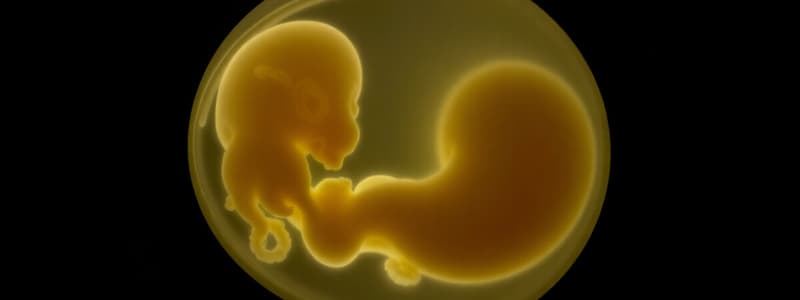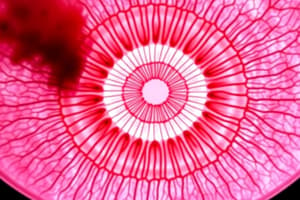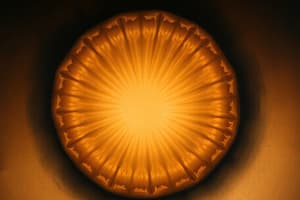Podcast
Questions and Answers
What is the composition of the embryonic disc at the end of week 2 of development?
What is the composition of the embryonic disc at the end of week 2 of development?
- Ectoderm, mesoderm, and endoderm
- Ectoderm and endoderm
- Epiblast only
- Epiblast and hypoblast (correct)
Which layer of the bilaminar embryonic disc is formed from the inner cell mass?
Which layer of the bilaminar embryonic disc is formed from the inner cell mass?
- Trophoblast
- Cytotrophoblast
- Synctiotrophoblast
- Hypoblast (correct)
What is the origin of the extraembryonic mesoderm?
What is the origin of the extraembryonic mesoderm?
- Hypoblast and trophoblast
- Cytotrophoblast only
- Hypoblast and Cytotrophoblast (correct)
- Hypoblastic cells only
What significant structure appears on the 7th or 8th day of development during bilaminar disc formation?
What significant structure appears on the 7th or 8th day of development during bilaminar disc formation?
Which of the following accurately describes one of the changes in the shape of the bilaminar embryonic plate?
Which of the following accurately describes one of the changes in the shape of the bilaminar embryonic plate?
Study Notes
Formation of the Bilaminar Disc
- The bilaminar disc is formed from the inner cell mass (ICM) of the blastocyst during early embryonic development.
- Composed of two layers: the epiblast and hypoblast.
- The epiblast is a layer of high columnar cells, while the hypoblast consists of small cubical cells.
Yolk Sac Development
- The yolk sac originates from an extension of the hypoblast.
- It has a roof formed by the hypoblast and a floor and sides constructed by Hauser's membrane.
Amniotic Cavity Formation
- The amniotic cavity develops from an extension of the epiblast around day 7 or 8.
- Boundaries include the amnioblast forming the roof and sides; the floor is formed by the epiblast.
Trophoblast Changes
- The trophoblast differentiates into two layers: cytotrophoblast (an inner mono-nucleated layer) and syncytiotrophoblast (an outer multinucleated mass).
- Isolated cavities known as lacunae appear in syncytiotrophoblasts and later form intervillous spaces in the placenta.
Extraembryonic Mesoderm Formation
- Arises from the hypoblast and cytotrophoblast and is located between the trophoblast externally and the primary yolk sac and amniotic cavity internally.
- The extra-embryonic mesoderm later forms isolated spaces that fuse to create the extraembryonic coelom.
Layers of Extraembryonic Mesoderm
- Divides into two distinct layers:
- Somatic mesoderm: lining the trophoblast.
- Splanchnic mesoderm: associated with the yolk sac.
Changes in Embryonic Shape
- The embryonic plate transitions from a circular shape to oval and eventually to a pear-shaped structure.
Composition of the Embryonic Disk at Week 2
- At the end of week 2, the embryonic disk is composed of epiblast and hypoblast (Answer: B).
Studying That Suits You
Use AI to generate personalized quizzes and flashcards to suit your learning preferences.
Related Documents
Description
This quiz covers key concepts in early embryonic development, focusing on the formation of the bilaminar disc, yolk sac, and amniotic cavity. It explores the structure and differentiation of the inner cell mass and trophoblast layers. Test your understanding of these foundational topics in embryology.



